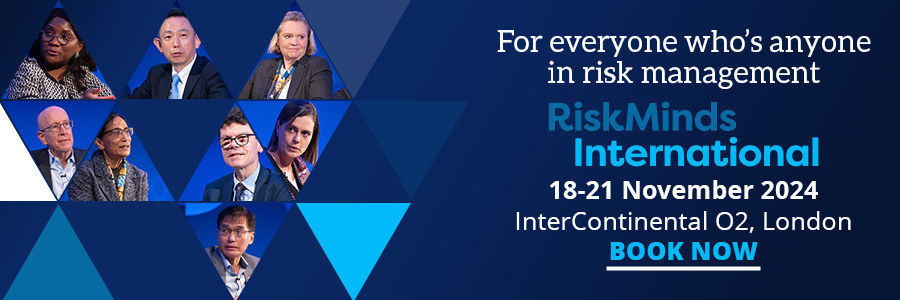The geopolitical and financial landscape of late 2024

In this insightful conversation, Manas Chawla, CEO of London Politica, discusses key geopolitical events and their potential impacts on financial institutions as 2024 draws to a close. Topics include US election, the Ukraine conflict, AI regulation, and financial regulatory policies. Manas also highlights possible scenarios in 2025, including geopolitical risks, macroeconomic challenges, and the US-China relationship, providing crucial guidance for financial institutions.
Read it below!
Manas, thank you so much for joining me at RiskMinds Americas this year. Tell me, in the last stretch of 2024, what events should financial institutions have on their radar?
We've got just a few months to go before the end of the year, but it's a packed geopolitical calendar.
I think the one thing that's already on everyone's minds, and rightfully so, should be the American elections. We're about 60 days to go [at the time of recording] and this race has been possibly more uncertain than any race we've ever seen.
I think financial institutions should be watching carefully for two things. One, there should be scenario mapping. What does each candidate's victory mean for them? But two, and I think this is overlooked, there should be scenario mapping. What are some of the black swan events that could happen? Some of the third possibilities that might pose risk and trouble for them, right?
One example, which I think is increasingly likely with how close this election will inevitably be is what happens when one side doesn't agree on who won the election? What happens when some state takes hours or days longer to count its vote? And, you know, one political party uses that to claim falsely that it's won the election to dispute election results. We've seen this happen before and thankfully we averted sort of the worst consequences.
But we've seen what happened on January 6th and a rerun of that is increasingly likely, particularly as we edge towards a political situation in the United States where winning the national popular vote isn't nearly enough. In fact, you could win that by a margin of up to 7 million people now. 7 million people because there's so many excess votes piled up of Democrats in New York and California. And you could still lose the electoral college, right? And what implications does this have for American foreign policy? Does it turn more inwards? Does it turn more isolationist?
Second thing is, this race has been so dominated as a race of personalities that we're forgetting that there's also an election for the Senate and the House. There's also an election in Congress. The makeup of that will shape significantly how much leeway either candidate has in terms of implementing its policies primarily.
In the case of Ukraine, even if Harris wins, it's still to be seen if she has enough support in Congress to pass another massive military aid package.
And speaking of Ukraine, I think one event that financial institutions should look out for is for the future of that country and for the future of Europe and what happens next in its invasion of Russia. Ukraine has now captured about 500 square miles of land in the Kursk region of Russia. However, those supply lines are really stretched right across hundreds and hundreds of miles. How Russia responds to this? Does it divert some more of its troops there? Does it keep pressuring on in the Donbas? What is the understanding on either side about the possibility of a negotiated political settlement?
All of these things will define where this conflict is headed in the next few months. And I think it will be a really important resolution, not just for Ukraine and Europe, but for the rest of the world.
So we've just talked about foreign policy and the potential outcomes for either of the candidates, but what about things like tech development and AI development? What about the regulations for them? What do you think will happen on that front?
Artificial intelligence is the buzzword on everyone's lips, not just at this conference, at every conference I've been to. But the really interesting thing is I think people overlook the political dimensions of AI development, deployment, and regulation. I think that's where a lot of the really interesting trends are happening and also where a lot of the hurdles and challenges will be to industries adopting and deploying AI.
If you look at the election cycle, we've seen something really interesting happen, right? For years we thought of San Francisco, of California, of these tech elite as squarely within the Democrat camp, right? Now you see a faction where that's not so much the case. You see people like Peter Thiel, right? Notable sort of Silicon Valley investor and tech mogul, that is playing a really key role in this election. Elon Musk, right? Pledging 45 million dollars to Donald Trump's campaign. The highest, perhaps, that we've seen in election history. Peter Thiel also introducing Donald Trump to JD Vance, right? They're playing really pivotal roles because they have an agenda. Not for pure altruistic reasons, but also because their agenda has a lot to do with AI, right? These people that are in charge of companies that contribute to the deployment and development of AI, want a light touch approach towards regulation, right?
That's also the case – and we talked about other tech trends and antitrust that we're seeing on the Democrat camp. The Democrats are also the party of big money, they have big tech donors. You can think of Reid Hoffman, the LinkedIn guy, vociferously advocating for lighter touch antitrust approach. You've got Lina Khan… the lots of these tech investors almost across the board are opposed to some of our policies and want to get rid of or want to change.
I think some of these markers are really important. What do these tech backers, these Silicon Valley political donations actually mean for the future of AI and tech development in the United States and for either party? And how does that actually play out, especially as these technologies continue to proliferate and accelerate in their development far beyond governments and regulators can take charge of them.
Amazing. What about the financial regulation side of things? Will there be a lighter touch there or is there a candidate that you’re expecting a non-lighter touch.
Across the board, what we're seeing is a lack of defined policies. We don't really know. We're still 60 days to go, which isn't that long of a time. But this is an election, like I said before, that's been played out on personalities, not on policies.
So, both the Republican and the Democrat campaign, we don't actually have a full-fledged manifesto of economic and financial policies, and particularly on the sort of regulatory front. What we can do is gleam some signs from things that they've already said, and here, you see the classic story.
Donald Trump, the Republicans, pledging a lighter touch approach. You can see what they've said on, for instance, corporation tax. You can see what they've said on regulation for businesses and big industries and big tech and big pharma and big healthcare. And you can see something of the opposite happening on the Democrat front.
And the Democrat party splintered a little bit – you've got more the progressives, that are further on the left. But the way that the Democrats will win these votes is also by getting some of the more mainstream centrist voters, particularly in the swing states. And to do that, it's constantly shifting its ideological base. Kamala Harris was once in favour of banning fracking. She's not anymore – why? Because it's a key issue in swing states. And so some of these dynamics, I think, are really key to watch out for. What states dictate what sort of approach for some of these candidates?
Kamala Harris now has proposed this unrealized capital gains tax. There's a lot of questions still to be answered on how we account for that, how we measure the value of assets, how that's actually implemented. So I think, that's where to watch for. What are the priorities in swing states? How do they define candidates’ postures going forward? And what actual impact does that have? There's still a lot to be said on that front.
I just wanted to close the conversation on what's going to happen in 2025. What's on your radar and what should be on financial institutions' radars?
I mean, with everything going on, it's so hard to already start looking at next year, but I think organisations have to in order to be prepared, right? By now, most people have woken up to the possibility that geopolitical risk is a significant risk and it actually impacts business operations, your actual assets on the ground.
I think going into 2025, the number one thing we need to do is to look at what the actual impacts of the American elections will be, beyond just who wins and who loses. How do they filter down? What are the transmission mechanisms, specifically from who wins to who they appoint for the regulatory front, for what policies they implement, for how much support they have in Congress, to what that actually does to your business, to what alternatives it has for your business. There's a lot of different steps to think about and that kind of systems thinking approach needs to be a lot more important, I think.
And I think a second thing is looking to the international front. We should be closely watching the macro environment. This is something we haven't mentioned so far.
Right now, this is the year of the landing, right? Every country's trying to approach something akin to a soft landing, trying to drive down inflation whilst avoiding a deep recession. And the United States has so far been successful in this, but all the other big central banks remain cautiously optimistic. There's a lot of givens in central banking policy. A lot of those givens and those presumptions are turning out to be incorrect. This year we priced in several rate cuts at the start of the year. That outlook changed significantly as we approach the summer. So I think that's one area to really cautiously pay attention to as we go into next year.
And the last thing I'll point out is China. I mentioned before that we have bipartisan consensus on hawkishness towards China. But I think what we're also seeing is that there's a real difference in degree and in scope in that sort of hawkishness. So Kamala Harris is most likely to continue Biden era policies – being tough on China, strong on China, pledging support towards Taiwan and continuing Biden era tariffs. What Donald Trump has proposed, however, is 60 percent tariffs on all Chinese imports across the board. That's not something we've ever seen in recent history. And whether or not that actually gets implemented how the Chinese react to that will have crucial consequences, not just for the US-China relationship, but for the world economy at large.
